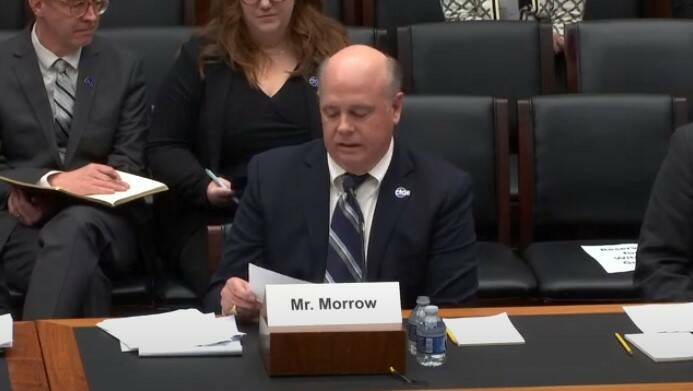Controversy over secretive raises for several administrators led the board of Island Transit to fire the executive director and place the Human Resources director on leave this week.
The board held a special meeting Wednesday, went into executive session and then returned to vote unanimously to terminate Executive Director Todd Morrow, effective immediately.
“I think it’s important that the board has trust and confidence in the decisions of the executive director and at this point I think there is a level of discomfort with some of the decisions and the direction,” Island County Commissioner Jill Johnson, a member of the transit board, said at the meeting.
Board members appointed Craig Cyr, a Langley council member and chair of the Island Transit Board, as the acting director. They also appointed Island County Commissioner Melanie Bacon, the former county HR director, as the interim HR director for the transit agency.
The day prior, the board had placed longtime Human Resources Director Robyn Goldring on administrative leave; her wage increase, from about $120,000 to $183,000, is at the center of the discord that led to the actions taken this week, according to board members.
After the board placed Goldring on leave, Morrow told her to disregard the board and return to work, but that didn’t happen; instead, he no longer works for the agency while she remains on leave, pending further discussions, board members said.
In addition, Cyr is recommending that the board hire a firm to conduct an organizational health and work environment study.
“I am concerned about morale and am looking forward to the results of the study,” he said.
The board commissioned a separate study earlier this year in response to concerns about possible discriminatory behavior, but the firm identified no problems from a legal standpoint.
Despite the drama, however, the board members emphasized that they are committed to the mission of the unique transit agency, which offers fare-free transportation to thousands of people each year in Island County. Aware of some community concerns about service, they are focused on making improvements to ensure consistency and reliability.
For the community, the incident may harken back to 2014, when transit board members were surprised by a financial crisis that led to layoffs, route cuts and the resignation of the director. Yet Cyr explained that the big difference now is that Island Transit is financially sound. In fact, officials have saved up $60 million for the transition to greener transportation.
Island Transit is an independent agency that is governed by a six-person board made up of all three Island County commissioners as well as members of the Oak Harbor City Council, the Coupeville Town Council and the Langley City Council. A union representative is also a non-voting member of the board.
Johnson is new to the board after talking her way on early this year because she was concerned about municipalities being overrepresented. Oak Harbor Councilmember Eric Marshall is also new, replacing Beth Munns in January.
Island Transit is funded by a combination of a 0.9% sales tax and state and federal grants. The sales tax is expected to generate more than $17 million this year while the agency’s total budget is nearly $39 million. The agency has a total of 140 full-time equivalent employees.
The secretive wage increases came about as a result of a salary study of non-represented employees that was completed last year. Board members were told that the budget for non-represented staff would increase overall, but they weren’t given any specifics. Bacon even asked for documents that showed the salaries and the step increase, but never received anything.
Nevertheless, the board adopted the budget. As several board members pointed out in interviews, they trusted the staff.
Cyr became the chairperson of the board in February. Soon afterward, he was alerted by an Island Transit employee that four administrators received pay increases of up to 50% or more, while others got little to none. The board members began discussions to figure out what happened, holding five executive sessions on the issue in a matter of months.
Bacon said in an interview that a labor market wage study for senior management officials on Whidbey Island shows that the $183,000 salary is way out of line for an HR director. The county HR manager, for example, has to handle about four times as many employees and earns closer to $120,000.
Bacon said the other transit managers who received raises are in positions that require more specialized knowledge, so a review will take a little more time. Cyr, however, said it’s very likely that the salaries will be adjusted.
Besides the HR director, the other administrators who received raises were not involved in the decision and were surprised by the large pay bumps.
While Morrow did not receive a secretive pay increase, the board members felt he was ultimately responsible for them as well as the decision to keep the information from his superiors, or at least not bring it to their attention, according to the board.
After repeated discussions with Morrow — and getting no defensible explanations — the board concluded this week that they had lost trust in him.
Cyr admits that some of the fault lies with the board.
“There needs to be more scrutiny,” he said. “We had trust and that trust was broken.”
As a result, he said, the board members are going to develop a check list and other procedures for ensuring that they are receiving and digesting the necessary information before making decisions.
The board meets on June 7 to discuss next steps, which might mean appointing an interim director or moving straight to finding a permanent replacement.
“We are going to move expediently, but we are going to take the time we need to do it right,” Cyr said.



